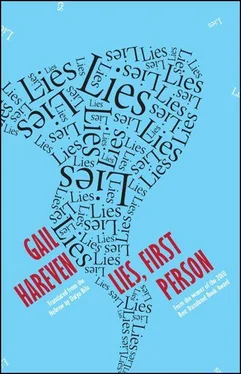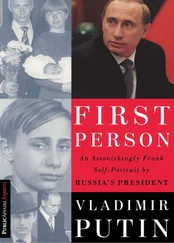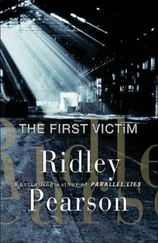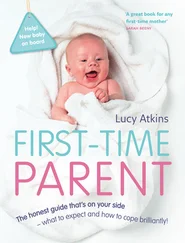“Fortunately for us,” said Menachem, “the author of this abomination doesn’t have one thousandth of the satanic talent of Nabokov. Just imagine if a really talented writer had written Hitler’s autobiography.”
“What does he want from me?” I wailed to Oded about two hours later, when we stood in the bathroom getting ready to go downstairs for dinner. “Just because I was once a Gotthilf, I have to prove to him that that crap makes me vomit? What does he expect me to prove? That I’m not a Gotthilf?”
Oded put a finger on his shaving cream mustache to signal me to lower my voice so as not to upset the boys.
“Apart from which,” I went on in a lower voice, “even though your father is the nicest person in the world, let’s not forget that he’s a lawyer.”
“What’s that got to do with it and how is it relevant?” Asked my husband without taking his eyes off the mirror. I didn’t know how it was relevant, but once I had begun, I went on unburdening myself, letting the words take over. “It means that he’s not exactly Mother Theresa, either. Anyone would think that all the clients he represents are saints. What gives him the right to interrogate me like that just because I’m. .”
My husband steadied his chin with one hand and with the other shaved off specks of foam, while setting the record straight for my benefit: Possibly, in my sensitivity, I had read his father’s intentions correctly, or possibly not. And perhaps Menachem, who as I well knew had a lot of respect for my opinions, honestly wanted to hear what I thought about a book that had shaken him to the core. He often asked my opinion on books, after all. Oded was sorry for the unpleasant experience I had endured, and he was especially sorry to know that he could have spared me if he had only done the obvious thing and thrown the book in the trash instead of putting it in the bookcase in the office.
“And as for Mother Theresa, nobody is Mother Theresa, maybe not even Mother Theresa herself. Lawyers, in the nature of the profession, represent all kinds, that’s true, but to the extent that I know my father, and to the extent that I know myself — neither of us is cut out to be a criminal lawyer.”
I sat down on the lid of the toilet, and from there I raised my eyes to the handsome profile of my attorney.
“Do you think I’m completely crazy?” I asked meekly when he appeared to be finished.
“An interesting question,” he shot at me. “I’ll have to consider it.”
“But do you think you’ll still want to go on being with me?”
“Be with you? Let’s see, I need time to think about it, but after the boys fall asleep I’ll definitely check it out.” He patted his face smugly with a towel, obviously pleased with himself and the charms that had enabled him to silence the howls of a madwoman so efficiently.
I imagine he said something in the course of the evening to his parents, or at least to his mother. Presumably he reminded them that any reference to the subject of my family upset me and “brought back the tragedy.” Because after dinner my mother-in-law drew me outside for a breath of fresh air, and when we walked down the steep street she linked arms with me and said: “Menachem can sometimes be so tactless. Mostly it happens when he gets carried away by some intellectual question. When he gets started on one of his hobbyhorses he can be as inconsiderate as a child, even though I don’t have to tell you what a kind-hearted man he is. Over the years I’ve learned not to take it to heart. In married life it’s sometimes best to keep quiet and overlook things.”
My husband said there was no going back, that we had to look to the future, that the river would flow where it wanted, but the two of us would go forward together.
“There’s no going back,” my husband said to me after the bottom feeder had phoned me and sent an email to his office. He raised his chin and directed my eyes to the horizon, and all that was missing was a brass band playing a march in the background, so enthused was he by the future.
After he finished singing me his song about our future, my boy-husband of the beetling brows went to take a shower, while I went on sitting in the kitchen with a cup of tea and a mental image of a vice squeezing my head.
It was the second month of the Not-man’s stay in our house, on a fine Saturday morning in the middle of winter. My mother came into our room and asked me to put on “something nice” and come down, because we were all going to have our photo taken with Uncle Aaron: and would I please hurry up, before the sky clouded over, and not detain our important guest who wanted to get back to work.
I didn’t put on anything nice, but I went out to the garden as I was bidden. The endless fuss with which my parents surrounded our guest embarrassed me, but to be honest I have to admit that part of my embarrassment stemmed from the thought of how we must look to him. His manners were exemplary, but the hint of a curl in his lip sometimes made me wonder whether they weren’t too perfect, as if he were playing a part and mocking us with a parody of a gentleman of the old school. Justice and honesty oblige me to admit that the supposed mockery hurt me, and that his opinion mattered to me. If I lie about this, I am liable to give the impression that I was wiser than my sister. I wasn’t wiser than her, and on the few occasions that I met him, I was stupid enough to try to impress him with my cleverness. The apple doesn’t fall far from the tree, and in my need to make an impression I was not so different from my mother. Among other things, I bragged about having read Kafka, and after he made a few remarks about “The Penal Colony,” I found the story and sat down to read it again through his eyes.
Our mother sat on a cushion she had placed on the damp seat of the swing-bench, and he on a cushion next to her, his legs stretched out in front of him, his heels dug into the ground to prevent any rocking. My mother was wearing one of her fancy ensembles, a white dress with a white striped jacket; all that was missing to complete the picture was a frilly parasol. I don’t remember what Elisheva was wearing, she was standing and waiting for me, fiddling with dad’s Leica camera. Our father wasn’t there. Perhaps he had already had his photo taken. Perhaps he had popped into the office to answer the phone. My sister’s hair was loose and combed with a neat part down the middle, a pink flower stuck crookedly over her ear: perhaps it was a pin, perhaps a blossom plucked from one of the vases in the dining room. It’s hard to remember. All I remember is a flower, and my guess is that our mother decorated her like this in honor of the photograph and our uncle.
If I had told Oded this, he would presumably have said that maybe I was right and maybe I wasn’t. My sister liked dressing up, and among her treasures was a collection of pins, mainly enamel lapel pins: a Bambi, a giraffe, a glittering black cat — like little toys. So perhaps she had a flower pin too, and perhaps she stuck it in her hair on her own initiative.
At first I was summoned to the swing. When it appeared that the sun was behind us and threatening to spoil the photograph, we got up and stood under the cypress tree, and then our mother said that with the rhododendron behind us would be prettier, and we moved to the flowers. Looking bored with all these consultations and moves, our uncle complimented our mother on her eye for aesthetics.
We arranged ourselves for the photograph: man in the middle, mother on one side and daughter on the other, as demanded by both family and aesthetic considerations. And while the photographer focused the lens, the man put his arms around the mother and the daughter.
Читать дальше












